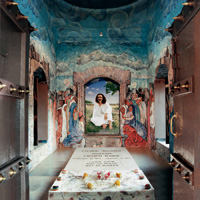By Eruch Jessawala

THERE IS A SHARP difference between the Avatar and the Sadguru in the dropping of their bodies.
When in His compassion God takes on a man-form in an advent as the God-Man or Avatar, it is Infinite consciousness that manifests. Being Infinite Consciousness, it always remains and functions as Infinite Consciousness. Therefore, when the Avatar sheds His man-form, He continues to be infinitely conscious of His creation and its creatures, and is mindful of His lovers who continue to adore Him in their hearts.
The proof of His being mindful is that time and again He continues to manifest as the Avatar, not only for mankind but also for those rare individuals who love Him wholeheartedly and pine for a sight of Him in the form they adore.
The Avatar’s descent into illusion takes place because God who is considered to be infinitely unreachable, makes Himself infinitely approachable by coming close to humanity.
When the Avatar drops His physical body, there is no lessening at all of His exercise of Infinite Love, Mercy, Compassion, Authority and Power. Hence anyone seeking help at the Tomb of the Avatar is not only assured of external benefits, but also derives spiritual benefits because of his direct approach to God for assistance.
Things are not the same in the case of the Sadguru. While the Sadguru does a lot of good for the world when he is in the body, after his death this functioning ceases for he is no longer connected with the world at any level. He continues to enjoy the infinite Bliss of his God state as before, but while Infinite Power is also there, He does not have the authority to use it.
Accordingly, wherever there is a tomb of a Perfect Master, there is Power but only the intensity of faith of the devotee can draw limited benefit from it in the form of external benefit. It is for this reason that people generally derive material benefit from the resting places of Perfect Masters. The spiritual benefit that was imparted by a Perfect Master when he was alive, has ceased to flow for he no longer has office or duty.
– Extracted from ‘The Ancient One’, Edited by Naosherwan Anzar, p201